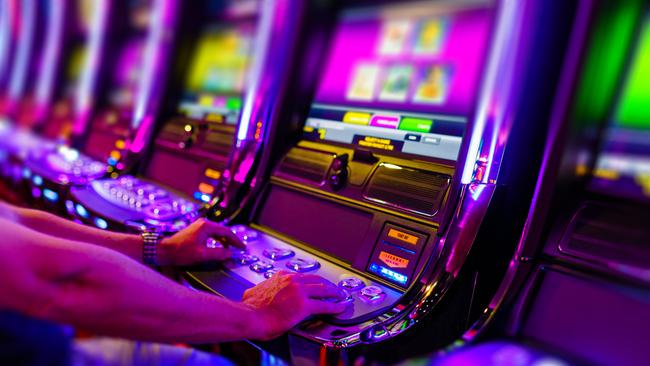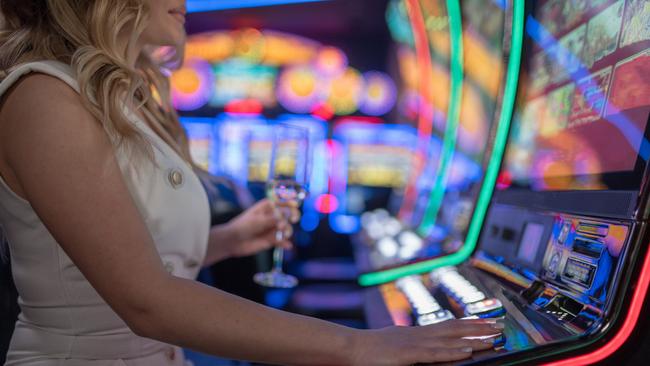Michael Mcguire: South Australians lost $831m to pokies in one year, and that’s unacceptable
New figures show the enormous amount South Australians lose on pokies every year. It’s time to change the rules, writes Michael McGuire.
Opinion
Don't miss out on the headlines from Opinion. Followed categories will be added to My News.
The widespread introduction of pokies to the state’s pubs and clubs in 1994 has been one of the most destructive public policy failures in South Australia’s history. Few other initiatives have caused such misery to problem gamblers, their families and the broader community.
And despite some desultory efforts by governments over the years to try to rein in some of the damage done by that initial dismal disaster the problem just continues to worsen.
The Sunday Mail carried the latest figures this week. According to the office of Consumer and Business Services, South Australians lost more than $831m to pokies operated in the state’s pubs and clubs in the year to June 30. That’s a record amount.
Helpfully, the CBS details how much money South Australians have donated to pokie machines across the years. In the first year of measurement, 1995, the number was more than $185m. A decade later it reached $750m.
In the early days of the Covid-19 pandemic, with pubs shut, it fell as low as $511.5m, but in the two years since it has roared back.

Why various state governments have paid little more than lip service to the harm caused by pokies across the past three decades comes down to two factors. One is the gambling tax revenue they rake in. Since the GST was introduced in 2000, state governments lost much autonomy in terms of state-based taxation. In return for the GST rivers of gold, state governments abolished many smaller local taxes.
The tax on gambling wasn’t one of those. Back again in 1995, the state government received $62.6m in gambling tax. Last year, on the back of those record losses, the state government received $356m, a nice little $36m jump from 2021.
The second reason state governments tread carefully when it comes to limiting pokie harm is the lobbying power of the Australian Hotels Association, which tends to run vociferous political campaigns when any significant reform is suggested.
The Sunday Mail story also gave a breakdown on which parts of SA lost the most on pokies. The local government areas with the biggest losses were Port Adelaide Enfield, Salisbury and Onkaparinga. This illustrates the fact that those who can least afford to lose money are the people donating most of their already limited income to hotels, clubs and the state government.
Which brings to mind the report by the Productivity Commission which estimated that 40 per cent of gaming revenue comes from problem gamblers.
But even if the state Labor government had the gumption, which is doubtful, to properly address this issue, what can be done? This is assuming an outright ban is unfortunately not feasible.
Part of the answer could be found in Tasmania, which is planning to introduce mandatory precommitment cards for pokie players by the end of 2024. Under the scheme, players will need to set daily loss limits at $100. The monthly limit would be $500 and annual losses capped at $5000.

Once a gambler reaches the limit they have to wait until the next period to play again.
Now $5000 still seems like a lot of money to throw away on blinking lights and electronic music, but at least it puts a cap on how much you can lose. And if you can prove you can afford to throw away even more, those limits can be raised.
It’s hard to know why SA would not also adopt such a scheme. Those who play socially or occasionally can still have a whirl, while those in danger of losing their house, family, job, and even life, have something of a safety net.
Of course, Australia’s problems with gambling extend beyond pokies. Australians are already the biggest punters in the world and seem intent on keeping that title as betting companies target younger and younger customers to create a whole new generation of problem gamblers.
Television is awash with sport betting advertisements (all of which are genuinely awful) which is increasing normalising the link between sport and gambling. All the major sport codes are in bed with gambling companies, which offer increasing numbers of ways to lose your money.
For example, one company is offering something like 50 different ways to become poorer during Wednesday’s T20 international between Australia and the West Indies.
In 2018, a report by the Australian Gambling Research Centre said 23 per cent of young men surveyed had their first bet before turning 18. It found advertising worked because those surveyed saw them as an “appealing, low-risk or no-loss betting option’’.
And most worrying, it found 70 per cent were at risk or were already experiencing harm from gambling.
Gambling promotion on TV should go the way of those ads which used to tell us how cool smoking was.
Perhaps you think this is all a bit nanny state. That gambling is just a bit of harmless fun. Maybe it is for some.
And for those none of the changes will stop them having a bet – they are not going to be worried by card limits or banning TV advertising – but for the increasing numbers of people who can’t control their gambling, more must be done.



